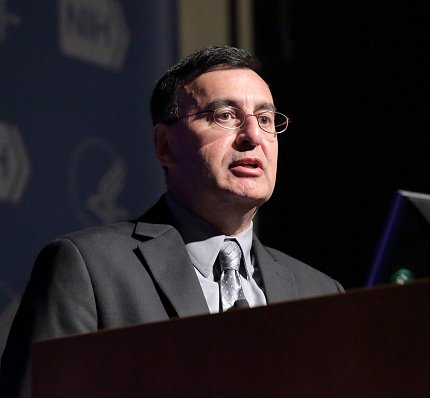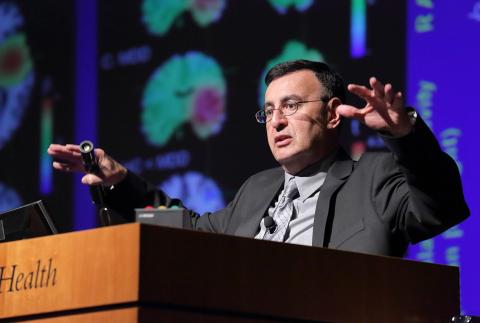Fast-Acting Drugs Could Revolutionize Depression Treatment

Photo: Daniel Soñé
Most antidepressants take weeks to work. Dr. Carlos Zarate hopes to develop one that works within hours.
Zarate is senior investigator and chief of the Experimental Therapeutics and Pathophysiology Branch and section on neurobiology and treatment of mood disorders, NIMH. At an Astute Clinician Lecture in Masur Auditorium recently, he reviewed progress in developing the next generation of antidepressants and described some of the challenges remaining in bringing them to market.
Mood disorders such as clinical depression and bipolar disorder are among the leading causes of disability worldwide. Zarate said people with these disorders “have disturbances of mood, behavior, circadian rhythms and activity levels, which cause severe impairment in the ability to function.”
People with bipolar disorder experience depression as well as manic episodes. During the latter, “individuals have increased energy levels, pressured speech, grandiosity, recklessness and significant decrease in the need to sleep,” he said.
Zarate estimated that 40-50 percent of people with major depressive disorder have more than one psychiatric disorder. Up to 90 percent of people with bipolar disorder have more than one psychiatric disorder.
Mood disorders can disrupt a person’s ability to work or attend school and also can damage relationships. They may even cause suicide. Right now, there are 30-40 anti-depressants on the market and they may take weeks before they work.
Progress developing new antidepressants has been slow, Zarate said, because of the difficulty in finding suitable models for higher-order brain functions in preclinical studies and also because the brain disorders, by their nature, are extremely complex. Some pharmaceutical companies no longer attempt to develop treatments for brain disorders, he added.
“We haven’t significantly changed the number of suicides that happen each year over time,” he said. “We have not decreased the prevalence of severe mental illness despite our treatments.”

Photo: Daniel Soñé
Over the past decade, ketamine has been proposed as an alternative to antidepressants currently available for patients with treatment-resistant depression and bipolar disorder. Zarate said ketamine is an FDA-approved anesthetic used in emergency rooms but not for depression. Its side effects include hallucinations and out-of-body experiences. Best known as an illicit party drug because of its hallucinogenic effects, ketamine is available at off-label clinics in many big cities.
Ketamine affects the brain’s glutamate system. Zarate said the system is involved in important brain functions such as learning and memory. Glutamate is the brain’s most common neurotransmitter. The drug blocks the NMDA receptor, which receives glutamate signals.
In several clinical studies, ketamine infusions given intravenously have been shown to relieve symptoms of depression within hours, he said. Symptom relief can last up to a week. Roughly 60 percent of patients responded to treatment.
On average, Zarate said, patients who enrolled in ketamine studies at the Clinical Center have tried at least 7 antidepressants. Most of the patients were unemployed. Half of them had attempted suicide several times and had multiple mood disorders.
The drug also can reduce thoughts of suicide in patients with bipolar disorder within 40 minutes of the infusion. Ketamine has the “potential to revolutionize the management of suicide,” he said. The idea is to have a rapid treatment for ER patients who have attempted suicide or who have suicidal thoughts. A fast-acting treatment could prevent patients from being institutionalized for lengthy periods of time.
Right now, Zarate is studying the neurobiological changes that occur with ketamine to determine why some patients respond to it and others don’t. He’s observed that patients with a family history of alcoholism are more likely to respond to treatment.
While results are promising, Zarate cautioned that more research needs to be done. It’s not clear what the best frequency of dosing is, although a recent study showed that 2 doses of ketamine in a week is just as effective as 3 doses per week.
Despite the obstacles, Zarate hopes that a drug that mimics ketamine’s antidepressant properties, without significant side effects, could be developed by 2017 or 2018, if all goes well.
